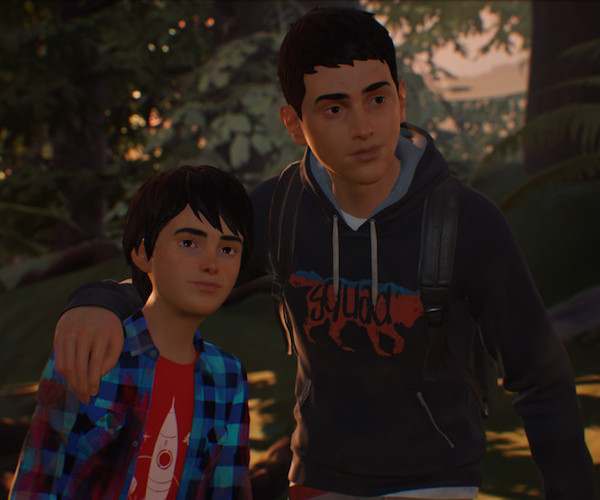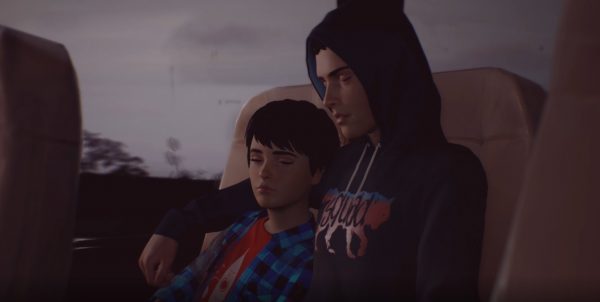Video Game Commentary: “Life Is Strange 2” — Indie Game Culture Goes Political
Life Is Strange 2 makes no secret about its sympathy for Mexican-Americans in the era of Trump.

A scene from “Life Is Strange 2.”
By Lianna Tedesco
Films and books routinely challenge how the country is run and by whom. But what happens when political norms are challenged by a video game developer? Isn’t playing video games just supposed to be about entertainment? Don’t ideological conflicts spoil the fun? Game developer DONTNOD is challenging this comfortable arrangement with the release of “Episode 1: Roads” in Life Is Strange 2.
I was an obsessive fan when the first Life Is Strange game was released, to the point where I’ve created a cosplay in honor of one of the main characters, Chloe Price. When Life Is Strange: Before the Storm was released, others besides myself were deeply impressed by its intense depiction of same-sex relationships. We watched, and had full control over, the blossoming romance between Chloe and her best friend Rachel. The same kind of harrowing life decisions are set up in Life Is Strange 2, but in the context of a more threatening reality. The decisions we have to make hit a bit closer to home—as in post-Trump-era close to home.
The purpose of a decision-based game is to empower players to create their own story, from beginning to end. While the introduction of Life Is Strange 2 started off normally, by the end of 30 minutes of gameplay I was initially too stunned to continue.
Two brothers, Sean and Daniel Diaz, come from a hard-working family. After their mother leaves, their father, Esteban, became responsible for moving them from Mexico to Washington state. It’s an area that’s not friendly to “outsiders.” The bond between the two brothers and their father is strong and placed under enormous pressure, and that leads to a development that is more shocking than in other DONTNOD games.
Sean Diaz, at only 17 years old, is in the process of getting ready to go to a party one night—typical high school stuff—and then out of the window we see the discriminatory bully of a next-door neighbor. The game provides an immediate option: defend your little brother or let him initiate combat right then and there. It’s not until a crack is made about his citizenship that Sean begins to fight and, without our permission, takes a swing, which results in injury to the neighbor. The cops show up at this point, and that would seem to be routine. Until one of the policemen pulls out his gun — for no apparent reason.
Life Is Strange 2 makes no secret about its sympathy for Mexican-Americans. Sean utters “I am a citizen” before administering the blow that will get his father shot in the process of defending him and his brother. The brutality of the scene reflects the violent nature of America today; the fact that a scenario like this one has found its way into the indie game culture is an explosive development. I applaud DONTNOD Entertainment for taking this step; many critics and players have been turned off by a video game this socially engaged. But shouldn’t art reflect the world that we live in, here and now?
As the game progresses, the political undertones grow more powerful. Sean and Daniel are on the move, running from the life they once knew to avoid being nailed for a crime that was (apparently) an accident. Of course, as real-life would have it, Sean will inevitably be arrested based on his background. Or will he? Your decision becomes more than just one of strategy — it becomes personal and political. This game draws on emotions and convictions that you ordinarily compartmentalize when playing a game. For some, this intrusion of today’s realpolitik will be out of bounds.
Near the end of Episode One, Sean and Daniel stop at a gas station to make a call on their way down to Mexico. The owner of the rest stop not only harasses them, but assaults and then restrains the pair in his office. He then calls the cops. At this point, the fear that you feel for these imaginary characters reaches a high point. Their captor tells them, “You’re the reason they need to build that wall.”

A scene from “Life is Strange 2.”
At this point, it is clear the game is not focused on having supernatural powers, which has been the premise of earlier Life Is Strange entries. Yes, Daniel’s telekinetic ability helps the brothers escape, but their captor’s wish for the wall grounds the narrative in a harsh reality.
Fortunately, the pair manage to escape after running into a freelance journalist, Brody, who is traveling the country and living out of his car. He is a liberal who fully understands and sympathizes with the two brothers after their threatening run-in. Sean says his father once told them there are “more Bigfoots than Mexicans” in this town. Brody responds that “these people are more afraid of you and your brother than Bigfoot.” Brody teaches Sean a lesson that no one should need to learn at 17: “Injustice is everywhere.” Still, the journalist supplies Sean with some hope for the future, telling him to “keep moving forward,” if only to assist his brother, who needs him desperately.
A recent review on IGN charged the game with being so political that it becomes “cartoonishly bigoted.” I agree that the narrative goes to extremes to make its point, but I disagree the result was “bigoted”– the underlining was necessary. Episode One of Life Is Strange 2 is heartbreaking and attention-getting. We lose the right to say that a story is too “bigoted” in the face of the Trump administration. What’s more, Brody makes the claim that “everything is political,” surely an argument that should make reviewers and game producers cautious about hurling insults, given the belief (profitable to the video game industry) that video games, no matter how violent, exist in an innocent realm of entertainment.
How will this game end up? Will it have a happy ending? Who knows, perhaps you, as the player, will be able to chose the fate of these brothers. For me, the first episode of Life Is Strange 2 makes an important, even radical, statement: identity politics will eventually seep into the gaming community. And that is a good thing. No matter how uncomfortable or brutally honest a story line, is it not our job as gamers to do what we do best? Look for the best ending, create the most equitable outcome? Can’t video games become a means to sketch social utopia?
Lianna Tedesco studied under poet Robert Plath, a former student of Allen Ginsberg, before finding her passion in English Literature and Political Science at St. Joseph’s College. She currently writes for several international online publications. When she’s not writing, she’s advocating for positive change, seeking out the next iconic video game, and charming strangers with her extraordinary sarcasm.
